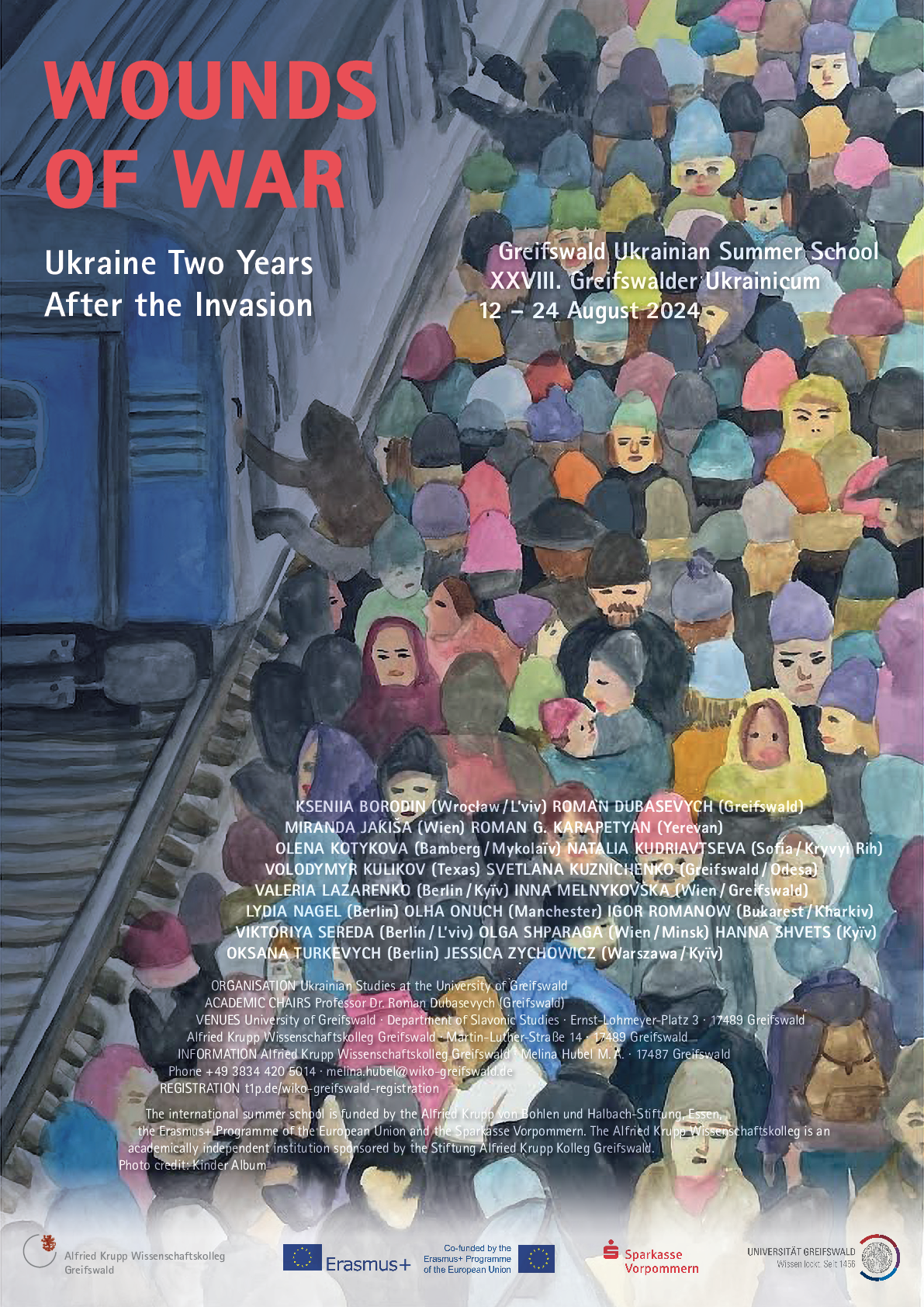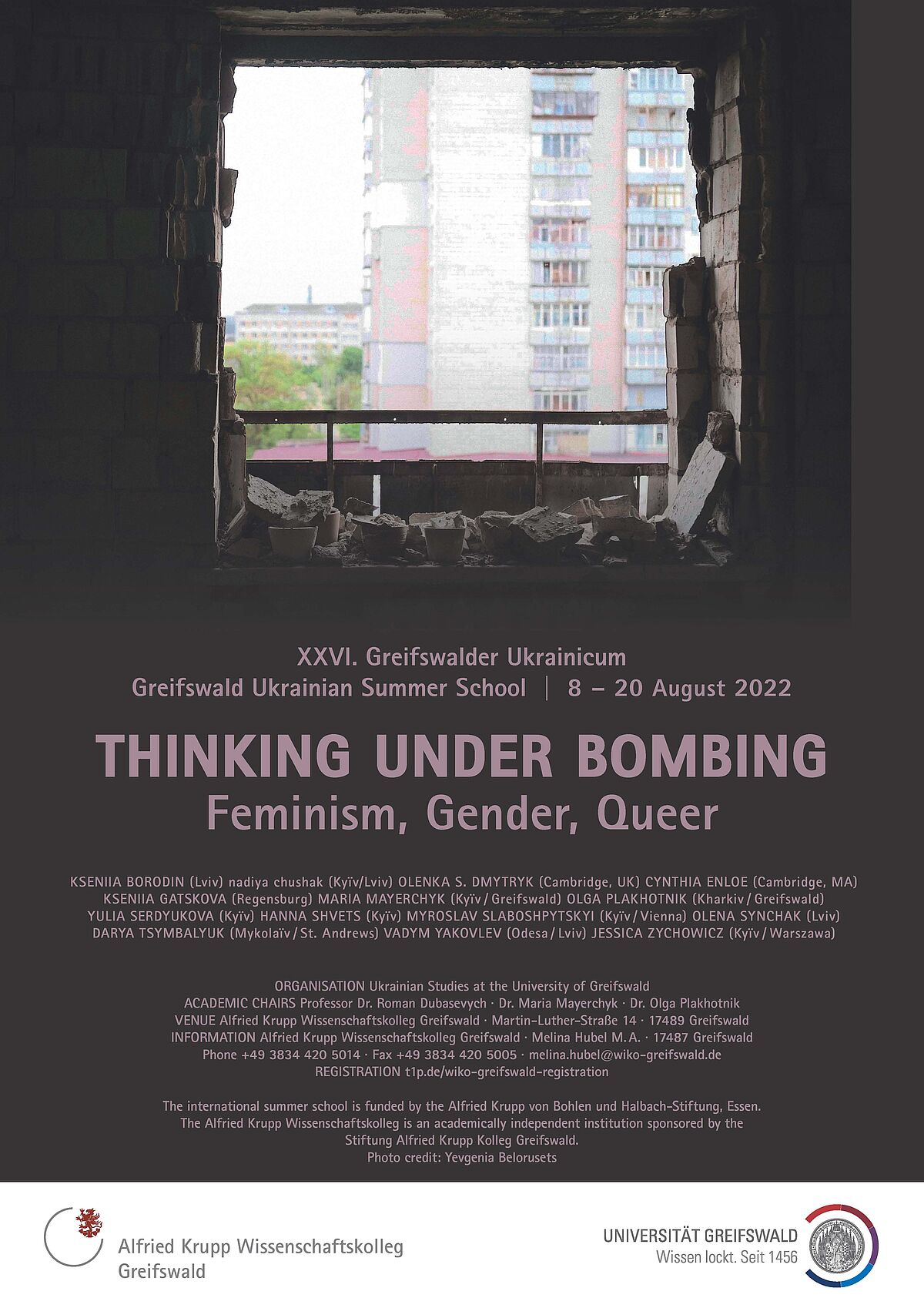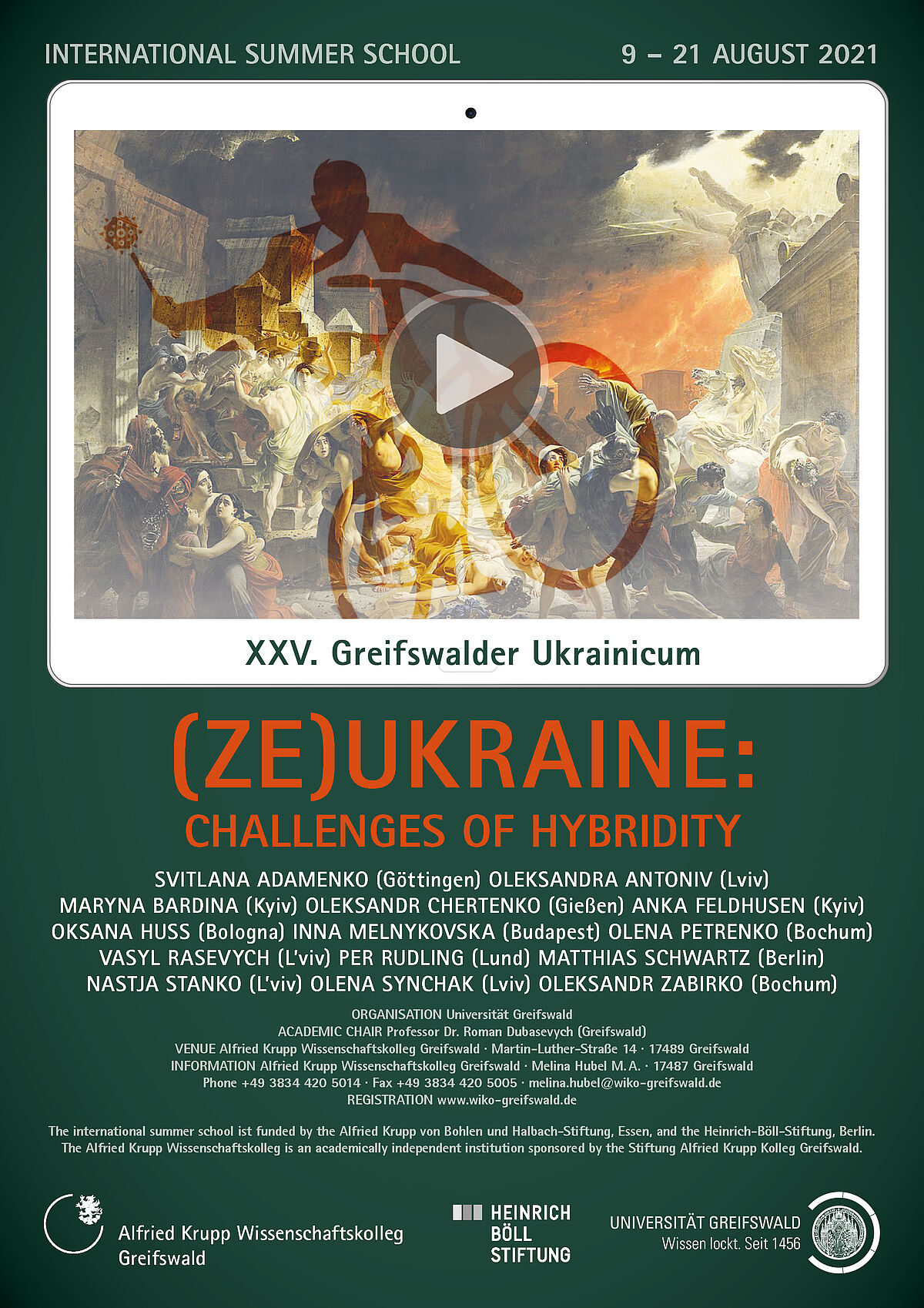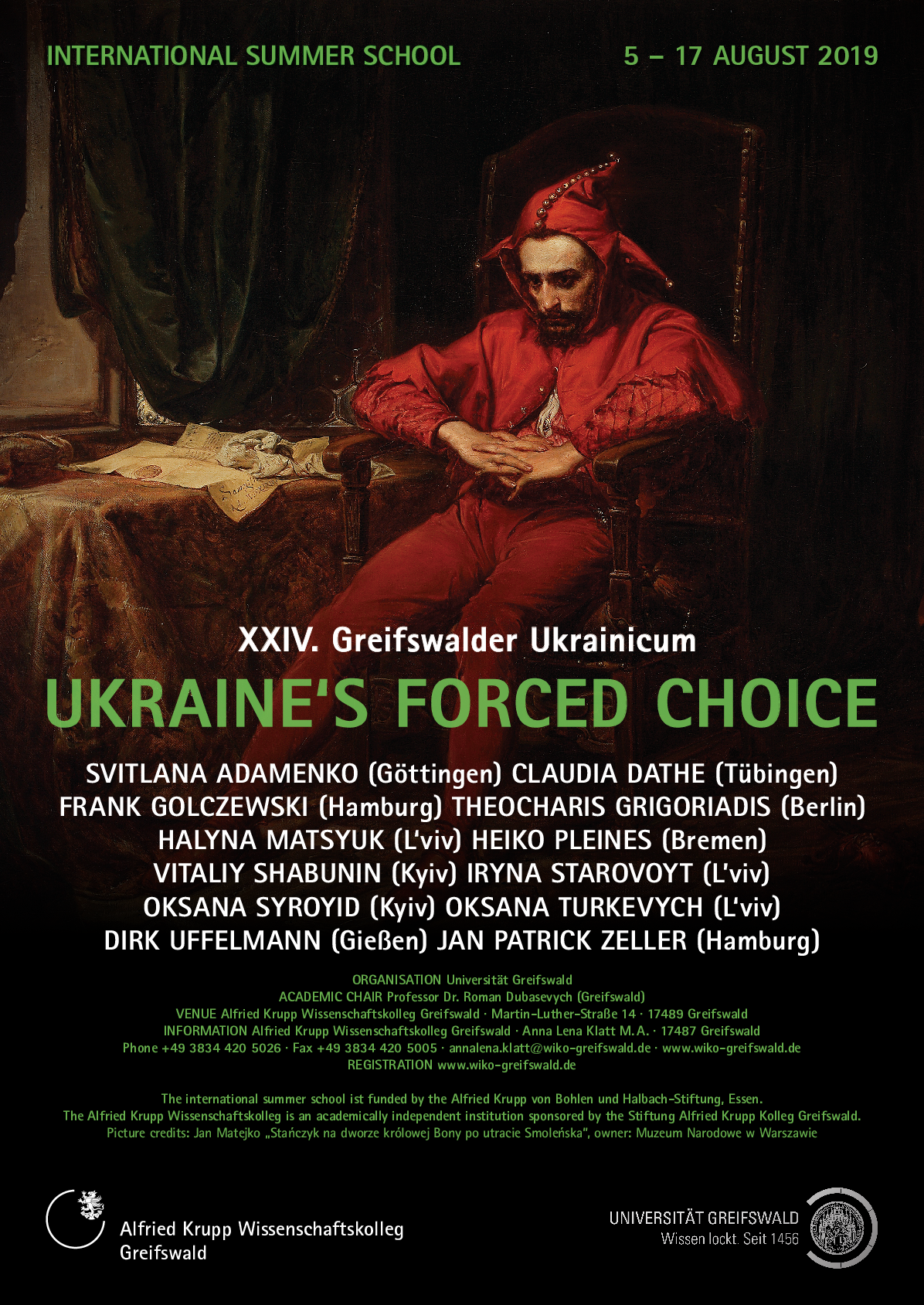Ukrainicum (Krupp-Kolleg)
Ukraine and the World: Paradise(s) Lost? (11. bis 23. August 2025)
XXIX. Greifswalder Ukrainicum – Greifswald Ukrainian Summer School under the scientific direction of Professor Dr. Roman Dubasevych (Greifswald)
please find German version below
The remarkable resilience and mobilization of Ukrainian society in the fight against Russian aggression often overshadow the profound feelings of nostalgia and mourning that have accompanied the war since its outbreak. The sorrow over daily human losses and the destruction of cities and landscapes is intertwined with a growing awareness of the irreversible transformation underway in Ukrainian society – marking the end of a long era post-World War II peace and gradual evolution.
Despite the promises of decolonization, decommunization, and de-russification giving allegedly the birth of a new European and global leader, Ukrainian society now appears as wounded, vulnerable, and limited in its agency as rarely before in its history. Moreover, the spectacular Ukrainian fighting spirits paradoxically co-exist with a growing war fatigue and nostalgia for peaceful past(s), including even the Soviet era – as illustrated by the widely acclaimed documentary Nazarii Iaremchuk: The Unmatched World of Beauty (2024).
This year, Ukrainicum seeks to explore these contradictions and ambivalences, as well as their impact on the current cultural and political landscape. What do they reveal about Ukrainian society and the increasingly turbulent global world? Are these moments of longing for a “lost paradise” merely decadent or “restorative” in the sense outlined by Svetlana Boym, or do they also represent a “reflective” effort to seek answers to pressing contemporary issues? Might such a Stefan Zweig-inspired exploration of the ‘worlds of yesterday’ offer insights into the causes of the war – or, like Ariadne’s fragile thread, point the way out of the labyrinth of alienation and confrontation epitomized in ‘my nation first’-mentality?
As always, Ukrainicum begins with its language courses, taught by our experienced instructors:
• Dr. Lesia Nazarevych (Ternopil’ State University) – Beginners
• Dr. Natalia Bahniuk (Ukrainian Catholic University, L’viv) – Intermediate
• Prof. Hanna Shvets’ (Taras Shevchenko National University, Kyїv) – Advanced
A traditional highlight marks the opening of our summer school: a keynote address by the renowned Swiss scholar and publicist Prof.Ulrich Schmid (University of St. Gallen), followed by cultural historian Prof. Alexander Dmitriev (Charles University, Prague), who offers a unique historical perspective on the catastrophic failure of Ukrainian-Russian dialogue that preceded the war. Prof. Michael Moser (University of Vienna), a leading international authority on Ukrainian language, will trace the complex history of multilingualism in Ukraine – one of the most contentious issues in contemporary Ukrainian identity debates. In the second week, Dr. Oksana Myshlovs’ka (U Bern), an expert on international history and politics, will examine how the silencing of critical voices within Ukraine contributed to the outbreak of violence and destruction of its peace. Dr. Ernö Heidel (Lund U) will explore how national narratives are constructed through national mythologies of Golden Age, Lost Paradise or Promised Land.
Further highlights include:
- A roundtable on nostalgia with Dr. Anna Novikov and Prof. Roman Dubasevych (both University of Greifswald), investigating how various societies long for (im)perfect worlds in times of turbulence – from Ukraine to Israel.
- Dr. Marina Dmitrieva (Leipzig University), who will discuss artistic responses to the war in Ukraine and Russia, offering insights into how art history can be de-centered and decolonized.
- Dr. Volodymyr Ishchenko (Free University of Berlin), who will analyze the deeper causes of the war in the broader context of post-Soviet developments, the local and global crises of hegemony.
- Dr. Susann Worschech (Viadrina University, Frankfurt/Oder), coordinator of the Competence Network Interdisciplinary Ukrainian Studies (KIU), who will speak on Ukrainian civil society and its ongoing struggle for democratization.
- At the end of the first week, the renowned translator and scholar Lydia Nagel (University of Greifswald) will host our traditional and acclaimed workshop on translation.
In addition to language instruction, seminars, and evening lectures, the program includes screenings of two films – among them the aforementioned Nazarii Iaremchuk: The Unmatched World of Beauty (2024). We will also take a group excursion on the first Sunday to the scenic Baltic Sea spa island of Rügen.
Ukraine und die Welt: Paradies(e) verloren?
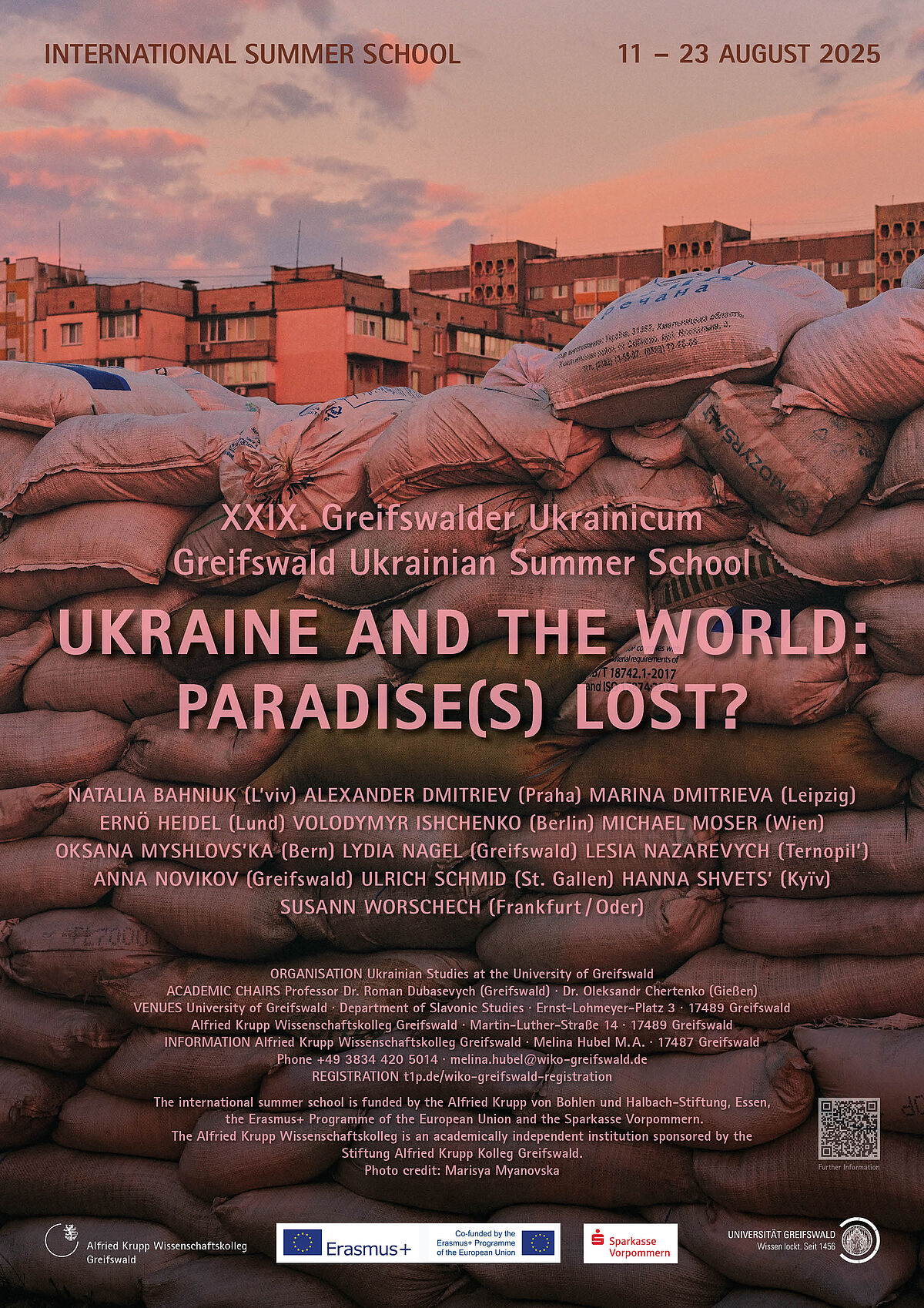
Die erstaunliche Resilienz und Mobilisierung der ukrainischen Gesellschaft im Kampf gegen die russische Aggression verdecken häufig die tiefgreifenden Gefühle von Nostalgie und Trauer, die den Krieg seit seinem Ausbruch begleiten. Der Schmerz über tägliche menschliche Verluste und die Zerstörung von Städten und Landschaften wird von einem wachsenden Bewusstsein für die irreversible Transformation der ukrainischen Gesellschaft begleitet, die das Ende einer langen Ära des Friedens nach dem Zweiten Weltkrieg sowie einer kontinuierlichen Evolution markiert.
Trotz der Versprechen von Dekolonisierung, Dekommunisierung und Derussifizierung, die zur Geburt eines neuen europäischen und globalen Akteurs führen sollten, erscheint die ukrainische Gesellschaft derzeit so verwundet, verletzlich und eingeschränkt in ihrem Handlungsspielraum wie nie zuvor in ihrer Geschichte. Dabei existiert der spektakuläre ukrainische Kampfgeist paradoxerweise neben wachsender Kriegsmüdigkeit und einer Sehnsucht nach einer friedlichen Vergangenheit – manchmal sogar nach der sowjetischen, wie der viel beachtete Dokumentarfilm Nazarii Iaremchuk: The Unmatched World of Beauty (2024) veranschaulicht.
Das diesjährige Ukrainicum möchte diese Widersprüche und Ambivalenzen sowie ihre Auswirkungen auf die aktuelle kulturelle und politische Landschaft der Ukraine erforschen. Was sagen sie über die ukrainische Gesellschaft und die zunehmend turbulente globale Welt aus? Sind diese Momente der Sehnsucht nach einem „verlorenen Paradies“ bloß dekadent oder „restaurativ“ im Sinne von Svetlana Boym, oder stellen sie auch einen „reflektierenden“ Versuch dar, Antworten auf die drängenden Fragen der Gegenwart zu finden? Könnte eine von Stefan Zweig inspirierte Auseinandersetzung mit den „Welten von gestern“ Einsichten in die Ursachen des Krieges von heute bieten und wie Ariadnes fragiler Faden den Weg aus dem Labyrinth der Entfremdung und Konfrontation weisen, das sich in der „my nation first“-Mentalität manifestiert?
Wie immer beginnt Ukrainicum mit seinen Sprachkursen, geleitet von unseren erfahrenen Dozentinnen:
- Dr. Lesia Nazarevych (Staatliche Universität, Ternopil’) – Anfänger:innen
- Dr. Natalia Bahniuk (Ukrainische Katholische Universität, L’viv) – Mittelstufe
- Prof. Hanna Shvets’ (Nationale Taras-Ševčenko-Universität, Kyїv) – Fortgeschrittene
Einen traditionellen Höhepunkt der Sommerschule stellt die Eröffnungsrede dar, die in diesem Jahr der renommierte Schweizer Slawist und Publizist Prof. Ulrich Schmid (Universität St. Gallen) hält. Das Seminar des Kulturhistorikers Prof. Alexander Dmitriev (Karls-Universität, Prag) bietet eine einzigartige historische Perspektive auf das katastrophale Scheitern des ukrainisch-russischen Dialogs vor dem Krieg. Prof. Michael Moser (Universität Wien), einer der führenden internationalen Spezialisten auf dem Gebiet der ukrainischen Sprache, wird die komplexe Geschichte der Mehrsprachigkeit in der Ukraine beleuchten – eines der umstrittensten Themen in der aktuellen ukrainischen Identitätsdebatte. In der zweiten Woche wird Dr. Oksana Myshlovs’ka (Universität Bern), Expertin für internationale Geschichte und Politik, untersuchen, wie die Unterdrückung kritischer Stimmen innerhalb der Ukraine zur Eskalation der Gewalt und zur Zerstörung des Friedens beigetragen hat. Dr. Ernö Heidel (Universität Lund) wird erforschen, wie nationale Narrative durch nationale Mythen vom Goldenen Zeitalter, verlorenen Paradies oder Gelobten Land konstruiert werden.
Weitere Höhepunkte sind:
- Eine Podiumsdiskussion zur Nostalgie mit Dr. Anna Novikov und Prof. Roman Dubasevych (beide Universität Greifswald), die sich damit beschäftigen wird, wie verschiedene Gesellschaften in Krisenzeiten nach (un)vollkommenen Welten verlangen – von der Ukraine bis nach Israel.
- Dr. Marina Dmitrieva (Universität Leipzig), die über künstlerische Reaktionen auf den Krieg in der Ukraine und in Russland sprechen wird und dabei Beispiele einer häufig geforderten Dezentrierung und Dekolonisierung der Kunstgeschichte vorstellt.
- Dr. Volodymyr Ishchenko (Freie Universität Berlin), der die tieferliegenden Ursachen des Krieges im weiteren Kontext postsowjetischer Transformation, lokaler und globaler Hegemoniekrisen analysiert.
- Dr. Susann Worschech (Europa-Universität Viadrina, Frankfurt/Oder), Koordinatorin des Kompetenznetzwerks Interdisziplinäre Ukrainistik (KIU), die über die ukrainische Zivilgesellschaft und ihren anhaltenden Kampf für Demokratisierung referieren wird.
- Am Ende der ersten Woche wird die renommierte Übersetzerin und Wissenschaftlerin Lydia Nagel(Universität Greifswald) unseren traditionellen und vielbeachteten Übersetzungsworkshop leiten.
Zusätzlich zu Sprachkursen, Seminaren und Abendvorträgen umfasst das Programm die Vorführung von zwei Filmen – darunter der bereits erwähnte Nazarii Iaremchuk: The Unmatched World of Beauty (2024). Außerdem machen wir am ersten Sonntag einen gemeinsamen Ausflug auf die malerische Ostseeinsel Rügen.
Kontakt
Greifswalder Ukrainicum
Melina Hubel M. A.
Tagungsbüro des Alfried Krupp Wissenschaftskollegs
Martin-Luther-Straße 14 · 17489 Greifswald
Tel.: +49 (0)3834 420 5014
melina.hubelwiko-greifswaldde
Ukrainicum 2024
Greifswalder Ukrainicum - Greifswald Ukrainian Summer School (12. bis 24. August 2024)
XXVIII. Greifswalder Ukrainicum – Greifswald Ukrainian Summer School unter der wissenschaftlichen Leitung von Professor Dr. Roman Dubasevych (Greifswald)
Zwei Jahre nach der russischen Invasion zeigt die ukrainische Bevölkerung weiterhin bemerkenswerten Widerstand und Resilienz bei der Verteidigung ihres Landes – trotz akuten Mangels an Munition, Kampfflugzeugen und Personal. Hinter den heroischen Bildern einer „ungebrochenen“ oder „unbesiegbaren“ Nation tritt jedoch allmählich eine zutiefst verwundete Gesellschaft hervor, die sich mit den erschütternden psychosozialen, ökologischen, wirtschaftlichen und kulturellen Kosten des Krieges auseinandersetzen muss.
Das diesjährige Ukrainicum würdigt einerseits den Widerstand, die Kreativität und die Opferbereitschaft gewöhnlicher und außergewöhnlicher Ukrainer*innen. Andererseits zielt es darauf ab, die vergangenen zwei Jahre zu reflektieren und die kurz- und langfristigen Folgen des anhaltenden Kampfes gegen die Zerstörung zu untersuchen und zu bewerten.
In Seminaren und Vorträgen, die sich auf die sozialen, wirtschaftlichen, ökologischen und psychologischen Auswirkungen des Krieges konzentrieren, widmet das Greifswalder Ukrainicum sich traditionsgemäß der Frage, wie die ukrainische Kultur auf dieses katastrophale Ereignis ihrer jüngsten Geschichte reagiert, darüber nachdenkt und sich damit auseinandersetzt.
Unser ebenfalls traditionell interdisziplinärer Ansatz gewinnt an Tiefe, indem wir die Erfahrungen anderer dramatischer – ob heißer oder eingefrorener – Konflikte und Schauplätze der Gegenwart heranziehen, wie etwa die Kriege im ehemaligen Jugoslawien, in Berg-Karabach oder in Belarus. Die vergleichende Perspektive stellt nicht nur den ukrainischen Fall in einen transnationalen und globalen Kontext, sondern bietet auch wertvolle Einblicke in die Dynamik moderner militärischer Konflikte – ihre Vergangenheit, Gegenwart und regt Diskussionen über ihr Ende und über die Zukunft nach apokalyptischen Ereignissen an.
Alle Teilnehmenden haben die Möglichkeit, zwei Wochen lang intensiv in Greifswald an diesen Themen zu arbeiten. Während dieser Zeit gibt es auch vielfältige Möglichkeiten, sich mit anderen Nachwuchswissenschaftler*innen und Wissenschaftler*innen zu vernetzen.
Die Unterrichtssprache ist Englisch. Für eine erfolgreiche Teilnahme sind Sprachkenntnisse auf dem Niveau B2/C1 oder höher erforderlich.
Ukrainicum 2023
Greifswalder Ukrainicum - Greifswald Ukrainian Summer School (07. – 19. August 2023)
XXVII. Greifswalder Ukrainicum – Greifswald Ukrainian Summer School under the academic direction of Professor Dr. Roman Dubasevych (Greifswald) and Dr. Oleksandr Chertenko (Giessen)
Ever since Russia launched its full-scale war against Ukraine on February 24, 2022, Ukraine has been the focus of attention on a global scale. Most commonly, the Russo-Ukrainian war has been explained, both in Ukraine and abroad, by applying the conceptual apparatus of Postcolonial Theory. In this vein, Putin’s aggression has been interpreted as a continuation of the centuries-old “Russian colonization.” Ukrainian resistance, in turn, has been largely recognized as an “anticolonial war” going hand in hand with a “decolonial” “canceling of Russian culture.”
Such univocal explanations, however, do not do justice to Ukraine’s multifaceted interactions with multiple imperial centers in the past and in the present, esp. with the Russian and the Soviet one. Moreover, they seemingly disregard Ukraine’s conflicting, often polyvalent memories and cultural self-identifications, which arise from different imperial experiences, presenting the country’s history as a kind of teleological unity. But can this understanding of Ukraine’s “postcoloniality” really cover the complexity of Ukraine’s cultural, political, social, and economic situation “after the empires”? And can Postcolonial Theory and Postimperial Studies be pulled back from the clutches of propagandistic oversimplification in times of war-induced mobilization?
Using this as a starting point, the upcoming summer academy will try to figure out how both Postcolonial Theory and Postimperial Studies can possibly remain productive for the analysis of the highly complex and dynamic balances of power and knowledge between culturally and ethnically related “colonizers” and “colonized.” What historical and cultural backgrounds does Ukrainian “postcoloniality” (or “postimperiality”) imply and what modes of interaction with imperial centers did it develop in the course of time? Can Ukrainian situation after 1991 (and after February 2022) be compared to the situation in other Eastern European (post-socialist, post-communist, post-Soviet) countries, such as Belarus or Poland, and if yes—what insights can such a comparison produce? Is there any space for the exploration of postcolonial complexities in wartime? What are the possible pitfalls for employing postcolonial/postimperial vocabulary and analytical tools?
The summer academy on Ukraine “After the Empires” will deal with these and other issues in a transdisciplinary manner. Basing on historical and contemporary Ukrainian examples, it will at the same time try to contextualize the phenomenon of “postcolonial Ukraine” within the “postcolonial Eastern Europe” and within the global debates on post- and decoloniality. We will thus focus on the specific profile of Ukraine’s post-socialist postcoloniality/postimperiality as compared to the postcolonialities in “classic” oversee colonies. On top of that, we will discuss other—non-Russian and non-Soviet—postcolonial/postimperial continuities, such as the legacies of the “Western” Polish-Lithuanian Commonwealth and the Habsburg Empire. Hereby, a highly complex relation between postcoloniality and nationalism, as well as various nationalist appropriations of the postcolonial discourse for the sake of “national consolidation” will be addressed. Ultimately, we will try to figure out what these multiple postcolonial/postimperial positionalities mean for the theory and how the theory could help us in understanding Ukrainian situation during and after the war.
All attendees will get a chance to work intensively on these topics for two weeks in Greifswald. During this time, they will also have multiple possibilities to network with other junior and experienced academics and scholars.
Greifswalder Ukrainicum - Greifswald Ukrainian Summer School (08. – 20. August 2022)
Greifswalder Ukrainicum – Greifswald Ukrainian Summer School Thinking Under Bombing: Feminism, Gender, Queer unter wissenschaftlicher Leitung von Professor Dr. Roman Dubasevych (Greifswald), Dr. Maria Mayerchyk (Kyїv/Greifswald) und Dr. Olga Plakhotnik (Kharkiv/Greifswald)
The "Greifswalder Ukrainicum" is an international summer school on science, culture and language of Ukraine, organised by the Alfried Krupp Wissenschaftskolleg Greifswald and the University of Greifswald. It is funded by the Alfried Krupp von Bohlen und Halbach-Stiftung, Essen, Germany.
"Thinking Under Bombing: Feminism, Gender, Queer" is set to deal with the most urgent of matters. The war challenges both regular and academic life in a way never imagined. Violence and displacement affect every gender alike, but not every gender in the same way. During our Ukrainicum, we will approach Ukrainian Gender and Queer Studies under the aspect of war and related themes. We will also discuss the contribution of these fields of studies to critical thinking about the war.All attendees will get a chance to work intensively for two weeks in Greifswald, start learning or polishing their Ukrainian in one of our three language courses and have the chance to network with other young academics and scholars.
XXVI. Greifswalder Ukrainicum’s keynote is Cynthia Enloe (Clark University).
This year’s seminars are going to be the following:
- Maria Mayerchyk (Kyїv/Greifswald): Genealogies of Ukrainian Feminisms
- Olga Plakhotnik (Kharkiv/Greifswald): Sexuality, Citizenship, and War
- Darya Tsymbalyuk (Mykolaїv/ St. Andrews): Feminist Approaches to working with Contexts of War and Displacement
- Jessica Zychowicz (Kyїv/Warszawa): Power, Intellectuals, War: Women on Violence in Ukraine
- Kseniia Gatskova (Regensburg): Gender Inequality in Ukraine: Labour Market in Focus
- Olenka S. Dmytryk (Cambridge): Aside from the Norm: Artistic Sexual/Gender Dissent and Social Formations in Ukraine
Guest speakers: nadiya chushak (Kyїv/Lviv), Yulia Serdyukova (Kyїv), Myroslav Slaboshpytskyi (Kyїv/Vienna), Vadym Yakovlev (Odesa/Lviv)
Ukrainian language courses by:
- Svitlana Adamenko (Göttingen)
- Kseniia Borodin (Lviv)
- Hanna Shvets (Kyїv)
Further lectures and discussions are to be announced. All participants are warmly invited to take part in the Workshop "Gender and War", which takes place as part of the "UnDisciplined: Pluralizing Ukrainian Studies"-Project on Saturday, August 13th 2022. The Alfried Krupp Wissenschaftskolleg Greifswald offers stipends for participation up to 400 Euros each. Please note that we cannot provide every attendee with a stipend. Also, the Kolleg and the Studierendenwerk Greifswald offer dorm rooms for scholarship holders. If you want to make use of this offer, please let us know in the application form. The cost of the dorm room (310 Euros) will be subtracted from the granted stipend.
Greifswalder Ukrainicum - Greifswald Ukrainian Summer School (09. – 21. August 2021)
Das Greifswalder Ukrainicum ist eine 14-tägige internationale Sommerschule des Alfried Krupp Wissenschaftskollegs Greifswald und der Universität Greifswald zur Wissenschaft, Kultur und Sprache der Ukraine und wird von der Alfried Krupp von Bohlen und Halbach Stiftung, Essen, gefördert.
Aufgrund der COVID-19-Pandemie wird das diesjährige Ukrainicum in Form einer digitalen Sommerschule stattfinden.
Mit Ukrainischkursen am Vormittag sowie Fachseminaren am Nachmittag bietet das Greifswalder Ukrainicum die Möglichkeit, von international renommierten Ukraine-Forscher*innen das Land in seiner Vielfalt intensiv kennenzulernen. Abendveranstaltungen (z.B. Filmvorführungen oder Vorträge) sowie eine von der Heinrich Böll Stiftung finanzierte Podiumsdiskussion ergänzen das Programm und bieten weitere Perspektiven auf das Land.
Die Teilnahme am Ukrainicum steht grundsätzlich allen Interessierten offen, wobei Studierende und Doktorand*innen bevorzugt werden.
Um Ihre Bewerbung für die Teilnahme einzureichen, nutzen Sie bitte das Onlineformular auf der Homepage des Alfried Krupp Wissenschaftskollegs.
Leider müssen wir Ihnen mitteilen, dass das Greifswalder Ukrainicum in diesem Jahr wegen Corona pausiert. Die geplante Sommerschule wird auf den Sommer 2021 verschoben. Sie soll vom 9.-21. August 2021 stattfinden.
Das Greifswalder Ukrainicum ist eine 14-tägige internationale Sommerschule des Alfried Krupp Wissenschaftskollegs Greifswald und der Universität Greifswald zur Wissenschaft, Kultur und Sprache der Ukraine und wird von der Alfried Krupp von Bohlen und Halbach Stiftung, Essen, gefördert.
Mit Ukrainischkursen am Vormittag sowie Fachseminaren am Nachmittag bietet das Greifswalder Ukrainicum die Möglichkeit, von international renommierten Ukraineforschern das Land in seiner Vielfalt intensiv kennenzulernen. Abendveranstaltungen (z.B. Filmvorführungen oder Vorträge) ergänzen das Programm und bieten weitere Perspektiven auf das Land.
Greifswalder Ukrainicum - Greifswald Ukrainian Summer School (05. – 17. August 2019)
Das Greifswalder Ukrainicum ist eine 12-tägige internationale Sommerschule des Alfried Krupp Wissenschaftskollegs Greifswald und der Universität Greifswald zur Wissenschaft, Kultur und Sprache der Ukraine und wird von der Alfried Krupp von Bohlen und Halbach Stiftung, Essen, gefördert.
Mit Ukrainischkursen am Vormittag sowie Fachseminaren am Nachmittag bietet das Greifswalder Ukrainicum die Möglichkeit, von international renommierten Ukraineforschern das Land in seiner Vielfalt intensiv kennenzulernen. Filmvorführungen sowie öffentliche Abendvorträge ergänzen das Programm und bieten weitere Perspektiven auf das Land.
Die Teilnahme am Ukrainicum auf eigene Kosten (eine Teilnahmegebühr wird nicht erhoben) steht allen Interessenten prinzipiell offen.
Anmelden können Sie sich hierfür ab sofort über eine Online-Anmeldemaske.
Für Studierende und Doktoranden aller Fachrichtungen schreibt das Alfried Krupp Wissenschaftskolleg Greifswald Reisestipendien zur Teilnahme am Greifswalder Ukrainicum aus.

